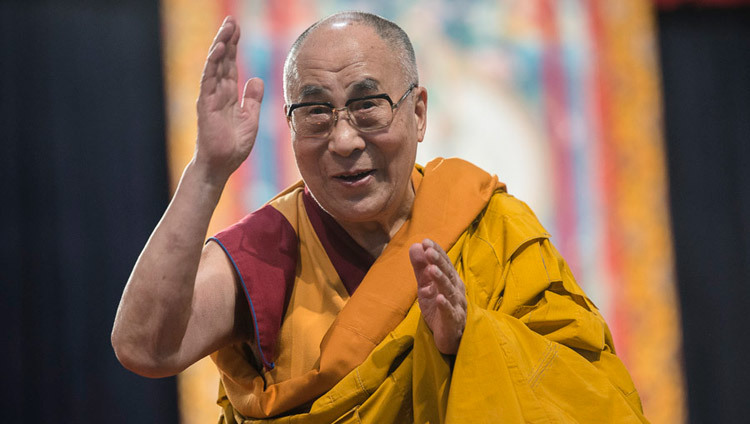World Religion: Did the Dalai Lama approve of gay marriage?
In a March 2014 segment on Larry King Now, a television series available through the digital TV network on demand Ora TV, His Holiness the Dalai Lama said that gay marriage is "OK". In light of His Holiness' previous statements that homosexual sex equates to "sexual misconduct", this seemed to be a reversal of his previous viewpoint.
However, his statement to Larry King was not at odds with what he said in the past. His fundamental position has always been that there is nothing wrong with homosexual sex unless it violates the precepts of one's religion. And that would include Buddhism, according to His Holiness, although in truth not all Buddhism would agree.
Appearance on Lary King
To explain this, first of all, let's take a look at what he said to Larry King about Larry King Now:
Larry King: What do you think of the whole emerging gay question?
HHDL: I think it is a personal matter. Of course, you see, people who have beliefs or who have special traditions, so you should follow according to your tradition. Like Buddhism, there are several types of sexual misconduct, so you should follow it correctly. But then for an unbeliever, it depends on them. So there are different forms of sex, as long as it's safe, OK, and if I fully agree, OK. But bullying, abuse, is wrong. This is a violation of human rights.
Larry King: What about same-sex marriage?
HHDL: It depends on the country's law.
Larry King: What do you think personally?
HHDL: Okay. I think it is individual business. If two people - a couple - really think it's more practical, more satisfying, both sides fully agree, then OK ...
Previous declaration on homosexuality
Last AIDS activist Steve Peskind wrote an article for the March 1998 issue of the Buddhist magazine Shambhala Sun, entitled "According to the Buddhist tradition: gay, lesbian and definition of sexual misconduct". Peskind said that in the February / March 1994 issue of OUT magazine, the Dalai Lama was quoted as saying:
“If someone comes to me and asks me if it's okay or not, I'll first ask if you have any religious vows to keep. So my next question is: what is your partner's opinion? If you both agree, I think I'd say that if two boys or two girls voluntarily agree that they have mutual satisfaction with no further implications of harming others, then that's fine. "
However, Peskind wrote, in a meeting with members of the gay community in San Francisco in 1998, the Dalai Lama said: "A sexual act is considered correct when couples use organs intended for sexual intercourse and nothing else", and then continued to describe heterosexual coitus as the only correct use of organs.
Is it flip flops? Not exactly.
What is sexual misconduct?
The Buddhist precepts include a simple precaution against "sexual misconduct" or not to "abuse" sex. However, neither the historical Buddha nor the early scholars have bothered to explain exactly what it means. The Vinaya, the rules for monastic orders, do not want monks and nuns to have sex at all, so that it is clear. But if you are an unmarried lay person, what does it mean not to "abuse" sex?
As Buddhism spread to Asia, there was no ecclesiastical authority to impose a uniform understanding of doctrine, as the Catholic Church once did in Europe. Temples and monasteries usually absorbed local ideas of what was right and what was not. Teachers separated by distance and language barriers often came to their own conclusions about things, and that's what happened with homosexuality. Some Buddhist teachers in parts of Asia decided that homosexuality was sexual misconduct, but others in other parts of Asia accepted it as a big deal. This is basically still today.
The Tibetan Buddhist teacher Tsongkhapa (1357-1419), a patriarch of the Gelug school, wrote a comment on the sex that Tibetans consider authoritative. When the Dalai Lama talks about what's right and what's not, that's what's going on. But this is only binding on Tibetan Buddhism.
It is also understood that the Dalai Lama does not have the sole authority to bypass a long accepted teaching. Such a change requires the consent of many senior lamas. It is possible that the Dalai Lama does not have a personal animus towards homosexuality, but takes his role as guardian of tradition very seriously.
Working with the precepts
Deciphering what the Dalai Lama says also requires understanding how Buddhists view precepts. Although somewhat similar to the Ten Commandments, Buddhist precepts are not considered universal moral rules to be imposed on everyone. Instead, they are a personal commitment, binding only for those who have chosen to follow the Buddhist path and who have taken the vows to keep them.
So when His Holiness said to Larry King: "Like Buddhism, there are different types of sexual misconduct, so you should follow it correctly. But then for an unbeliever, it depends on them, "he is basically saying that there is nothing wrong with homosexual sex unless it violates some religious vow you have taken. And that's what he always said.
Other schools of Buddhism, such as Zen, accept homosexuality a lot, so being a gay Buddhist is not necessarily a problem.
